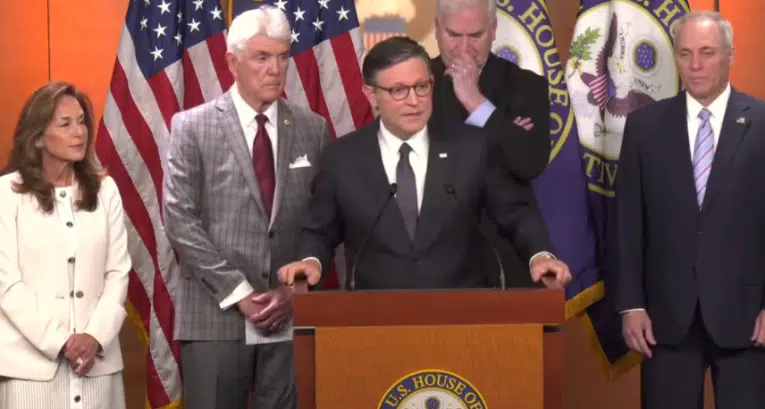
Provisions in two upcoming appropriations bills would defund Labor Department regulations allowing employer-based retirement investments into Environmental, Social and Governance (ESG) funds, prohibit federal employee retirement investments by the $800 billion Thrift Savings Plan into ESG funds and would defund implementation of the Securities and Exchange Commission’s Climate Disclosure Rule.
With a little more than two weeks left to go until a Nov. 17 funding deadline, the U.S. House is continuing to consider a flood of appropriations bills, including the Labor, Health and Human Services and Education funding bill, which addresses the Labor Department rules, and the Financial Services and General Government funding bill, which addresses the Thrift Savings Plan and Climate Disclosure Rule.
Republicans’ brand-new policy riders attack so-called “woke” investments that seek to address climate change, social justice and equity via caps on carbon emissions and racial and gender hiring quotas (dubious under a textual reading of Title VII of the Civil Rights Act) by concentrating capital investments into certain companies that meet the ideological goals of being green and implementing diversity and inclusion human resources policies.
ESG investments in the U.S. have grown to $8.4 trillion in 2022, according to the latest data by the USSIF, The Forum for Sustainable and Responsible Investment.
A 2020 regulation by the Trump Labor Department watered down a regulation by the Barack Obama Labor Department in 2015 allowing ESG investments into tax-deferred, employer-based retirement savings accounts like the $6.3 trillion 401(k) market and other defined benefit and defined contribution plans totaling $11.9 trillion.
The 2020 effort mirrored a 2008 regulation by the George W. Bush Labor Department, but was promptly overturned via a May 2021 executive order by President Joe Biden defining climate change a financial risk under ERISA and affirmed later via a 2022 regulation by the Biden Labor Department. And the 2008 regulation was a revision of a 1994 regulation by the Bill Clinton Labor Department, which in turn were revisions to the rules made by prior administrations.
All of these rules are based on the fiduciary duties and obligations defined under federal law in 29 U.S.C. Section 1104, which states, “a fiduciary shall discharge his duties with respect to a plan solely in the interest of the participants and beneficiaries and… for the exclusive purpose of … providing benefits to participants and their beneficiaries; and … defraying reasonable expenses of administering the plan; … with the care, skill, prudence, and diligence under the circumstances then prevailing that a prudent man acting in a like capacity and familiar with such matters would use in the conduct of an enterprise of a like character and with like aims; … by diversifying the investments of the plan so as to minimize the risk of large losses, unless under the circumstances it is clearly prudent not to do so; and … in accordance with the documents and instruments governing the plan insofar as such documents and instruments are consistent with the provisions of this subchapter and subchapter III.”
So far, Republican administration attempts to hold back ESG had depended on fiduciary rules, that state as long as investments remain profitable commensurate with other non-ESG investments, then environmental, social and other factors may be taken into consideration when making economically targeted investments.
In this case, Congressional intervention appears to up the GOP’s ante on the issue, instead seeking outright prohibitions on these investments, including on investments into the aforementioned $800 billion federal Thrift Savings Plan that President Biden greenlighted in 2022 via the Financial Services appropriations rider.
It is a limited approach. The Labor Department rule only touches employer-based defined benefit and defined contribution plans, which total about $11.9 trillion currently, but only make up 36.8 percent of the $32.3 trillion retirement savings market nationwide.
These Congressional defunds, for example, do not necessarily impact the $11.7 trillion Individual Retirement Accounts (IRAs) market or the $10 trillion in state and local government retirement investments, including state government employee retirement funds in California, New York, Colorado, Connecticut, Maine, Maryland and Oregon.
But this is still by far the most aggressive approach Republicans have ever considered legislatively to take on ESG. The fact that the policy riders came out of the appropriations committee shows that GOP leadership has embraced this policy approach, which increases the odds they can find their way into the final legislation between the House and Senate.
The legislation would also prohibit the Securities and Exchange Commission (SEC) from completing and implementing its Climate Disclosure Rule that implements ESG-based carbon emissions disclosures into securities regulations. The rule seeks to address supposed “greenwashing” by corporations when making climate sustainability claims, with the SEC determining which corporations are eligible for inclusion in ESG funds and the additional, weighted capital infusions that come with it being directed by massive hedge funds with trillions of dollars under management like Vanguard and Blackrock, which then vote the shares of their clients in corporate elections.
A recent KPMG survey finding 82 percent of U.S. corporations are touting ESG sustainability goals in their corporate filings, creating a ripe target for the SEC. Ironically, virtue signaling with the sustainability claims by no means guarantees weighted inclusion in hedge funds’ ESG funds like BlackRock, Vanguard, etc. Now, the SEC wants to pick winners and losers in ESG, punishing firms that fail to reduce carbon emissions.
The impact of ESG has not been lost on Republican state attorneys general. In 2022, former Arizona Attorney General Mark Brnovich and former Nebraska Attorney General Doug Peterson and 17 other Republican Attorneys General that threatened the $10 trillion hedge fund BlackRock with antitrust legal action.
In an Aug. 4, 2022 letter to BlackRock CEO Larry Fink accusing the company of “intentionally restrain[ing] and harm[ing] the competitiveness of the energy markets” with its market dominance of retirement investments.
Brnovich and Peterson added, “coordinated conduct with other financial institutions to impose net-zero [carbon emissions by 2050] … raises antitrust concerns. Group boycotts, restraining trade, or concerted refusals to deal, ‘clearly run afoul of’ Section 1 of the Sherman Act [according to the Supreme Court]. Section 1 prohibits ‘[e]very … combination … , or conspiracy, in restraint of trade or commerce.’ Regarding the definition of a ‘combination,’ the Supreme Court has held that this language prohibits ‘concerted action.’”
In a similar vein, America First Legal and other conservative organizations have begun filing Title VII civil rights complaints against companies that have adopted ESG’s racial and gender based hiring quotas.
These are very important developments. Until recently, the current expectation had been that the “invisible hand” of the market should provide the correction needed in the culture war and against the green cartel. While some commentators have sought to proclaim that woke is over, pointing to recent stock market volatility, I fear it’s not enough, and that the incentives that have been put into place, whether to go green or do diversity, equity and inclusion, are truly what need to be addressed.
Now, with Congress weighing in, Republicans appear to be making this issue a top priority, using its Congress’ constitutional, Article I power of the purse to take down the government-based incentives and subsidies that in part have fueled ESG. If woke is over, why are House Republicans still fighting against it?
Robert Romano is the Vice President of Public Policy at Americans for Limited Government.






